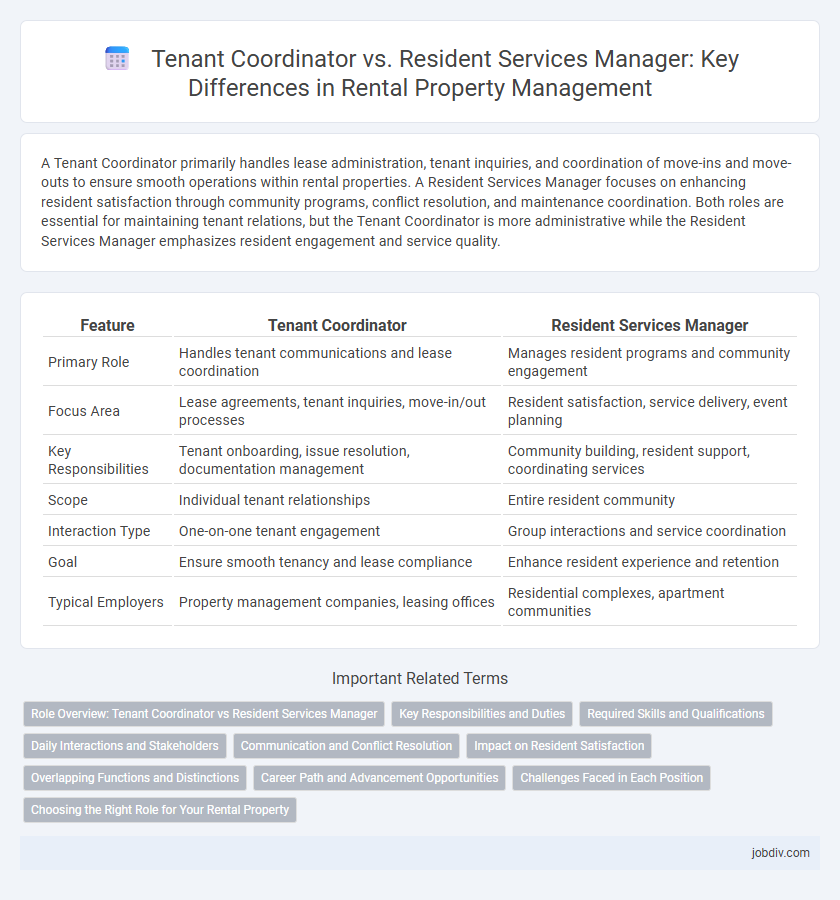A Tenant Coordinator primarily handles lease administration, tenant inquiries, and coordination of move-ins and move-outs to ensure smooth operations within rental properties. A Resident Services Manager focuses on enhancing resident satisfaction through community programs, conflict resolution, and maintenance coordination. Both roles are essential for maintaining tenant relations, but the Tenant Coordinator is more administrative while the Resident Services Manager emphasizes resident engagement and service quality.
Table of Comparison
| Feature | Tenant Coordinator | Resident Services Manager |
|---|---|---|
| Primary Role | Handles tenant communications and lease coordination | Manages resident programs and community engagement |
| Focus Area | Lease agreements, tenant inquiries, move-in/out processes | Resident satisfaction, service delivery, event planning |
| Key Responsibilities | Tenant onboarding, issue resolution, documentation management | Community building, resident support, coordinating services |
| Scope | Individual tenant relationships | Entire resident community |
| Interaction Type | One-on-one tenant engagement | Group interactions and service coordination |
| Goal | Ensure smooth tenancy and lease compliance | Enhance resident experience and retention |
| Typical Employers | Property management companies, leasing offices | Residential complexes, apartment communities |
Role Overview: Tenant Coordinator vs Resident Services Manager
A Tenant Coordinator primarily manages lease administration, tenant communications, and maintenance requests, ensuring smooth daily operations within rental properties. Resident Services Managers focus on enhancing tenant satisfaction by organizing community engagement programs, resolving resident issues, and overseeing amenities management. Both roles contribute to tenant retention but differ in operational scope and resident interaction intensity.
Key Responsibilities and Duties
Tenant Coordinators manage lease agreements, coordinate move-ins and move-outs, and handle tenant communications to ensure smooth occupancy processes. Resident Services Managers oversee community engagement, maintenance requests, and conflict resolution to enhance resident satisfaction and retention. Both roles require strong organizational skills, but Tenant Coordinators focus more on administrative leasing tasks while Resident Services Managers emphasize ongoing resident support and community well-being.
Required Skills and Qualifications
Tenant Coordinators require strong organizational and communication skills to manage lease agreements, coordinate tenant move-ins and move-outs, and address tenant inquiries efficiently. Resident Services Managers typically need advanced problem-solving abilities, leadership experience, and knowledge of property management software to oversee resident satisfaction, enforce community policies, and coordinate maintenance teams. Both roles demand proficiency in conflict resolution, customer service, and familiarity with local housing laws to ensure compliance and foster positive tenant relationships.
Daily Interactions and Stakeholders
Tenant Coordinators manage daily interactions with prospective and current tenants, facilitating lease agreements and addressing initial inquiries, while Resident Services Managers oversee ongoing resident satisfaction by coordinating maintenance requests and community events. Tenant Coordinators primarily engage with leasing agents and property managers to streamline occupancy, whereas Resident Services Managers collaborate closely with maintenance staff, vendors, and resident committees to enhance living experiences. Both roles require strong communication skills but differ in their focus on lease initiation versus tenant retention and community building.
Communication and Conflict Resolution
Tenant Coordinators specialize in direct communication with tenants, addressing daily inquiries and facilitating timely conflict resolution through mediation and active listening. Resident Services Managers oversee broader community relations, implementing structured communication strategies and managing complex disputes with formal conflict resolution protocols. Both roles prioritize clear communication channels, but Tenant Coordinators emphasize immediate tenant interactions while Resident Services Managers focus on long-term community harmony and service quality.
Impact on Resident Satisfaction
Tenant Coordinators primarily handle leasing processes and communication, ensuring smooth move-ins and lease compliance, which directly improves resident trust and satisfaction. Resident Services Managers focus on long-term community engagement, organizing events, and addressing resident concerns, fostering a stronger sense of belonging and retention. Both roles are crucial in enhancing overall resident satisfaction by balancing administrative efficiency with personalized community support.
Overlapping Functions and Distinctions
Tenant Coordinators and Resident Services Managers both facilitate effective tenant relations and ensure community satisfaction within rental properties. Tenant Coordinators primarily handle lease coordination, move-in logistics, and conflict resolution, while Resident Services Managers focus on enhancing community programs, resident engagement, and long-term tenant retention. Although their roles overlap in addressing tenant needs and communication, the Coordinator's responsibilities are more transaction-focused, whereas the Manager emphasizes strategic community development and service delivery.
Career Path and Advancement Opportunities
Tenant Coordinators typically manage lease agreements, coordinate move-ins and move-outs, and serve as the primary point of contact for tenant inquiries, providing foundational experience in property management. Resident Services Managers oversee broader community engagement, coordinate maintenance and resident programs, and manage tenant satisfaction, offering advanced leadership opportunities and higher responsibility. Career advancement usually progresses from Tenant Coordinator to Resident Services Manager, with further potential to move into property management or regional supervisory roles.
Challenges Faced in Each Position
Tenant Coordinators often face challenges related to maintaining consistent communication between tenants and property management while efficiently resolving maintenance requests and lease inquiries. Resident Services Managers encounter complex demands managing community engagement, coordinating large-scale events, and addressing diverse resident concerns to enhance tenant satisfaction and retention. Both roles require strong problem-solving skills, but Tenant Coordinators prioritize operational efficiency, whereas Resident Services Managers focus on fostering a vibrant residential community.
Choosing the Right Role for Your Rental Property
Tenant Coordinators manage lease agreements, coordinate move-ins and move-outs, and address tenant inquiries to ensure efficient occupancy. Resident Services Managers focus on enhancing tenant satisfaction through community engagement, conflict resolution, and organizing resident programs. Selecting the right role depends on your property's needs for operational efficiency versus tenant experience and retention.
Tenant Coordinator vs Resident Services Manager Infographic

 jobdiv.com
jobdiv.com